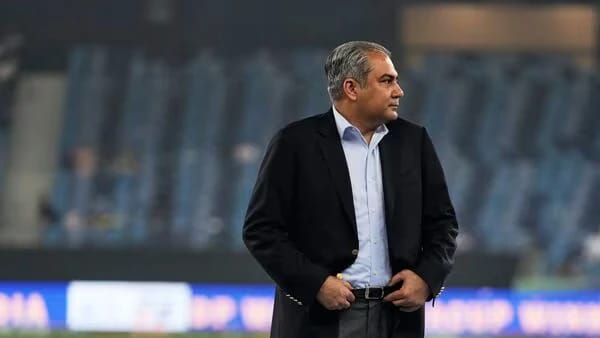Pakistan to honor Mohsin Naqvi with gold medal for Asia Cup trophy controversy against India

Pakistan to honor Mohsin Naqvi with gold medal for Asia Cup trophy controversy stance against India
In a move that has sparked fresh debate across the cricketing world, Pakistan is set to honor Mohsin Naqvi—the Asian Cricket Council (ACC) chairman and Pakistan's Interior Minister—with a prestigious gold medal for his controversial actions during the Asia Cup 2025 final. While the international cricket community largely condemned Naqvi's decision to take the trophy and medals away from the venue, Pakistan views his stance as a matter of national pride.
The award and planned ceremony
Mohsin Naqvi will receive the Shaheed Zulfiqar Ali Bhutto Excellence Gold Medal in recognition of what organizers describe as his "principled and courageous stance" during the trophy presentation controversy. A formal award ceremony is being planned in Karachi, with Pakistan Peoples Party (PPP) Chairman Bilawal Bhutto Zardari invited to attend as chief guest. The exact date of the event has not yet been finalized, pending Bhutto's availability.
The announcement was made by Advocate Ghulam Abbas Jamal, President of the Sindh and Karachi Basketball Associations, who praised Naqvi's actions as having "restored national pride" at a time when political and sporting tensions with India were at an all-time high.
"This is not just about cricket. It is about dignity, sovereignty, and the refusal to bow under pressure," Jamal stated in his announcement.
A special committee has been established to oversee the event, chaired by Sindh Basketball Association head Khalid Jameel Shamsi, with Director Sports of Karachi, Ghulam Muhammad Khan, serving as secretary.
What happened at the Asia Cup final
The controversy erupted immediately after India's five-wicket victory over Pakistan in the Asia Cup 2025 final held in Dubai on September 28. Following established protocol throughout the tournament, the Indian team—led by captain Suryakumar Yadav—refused to accept the Asia Cup trophy and winners' medals from Mohsin Naqvi due to his position as both Pakistan's Interior Minister and PCB chairman.
The refusal was rooted in heightened geopolitical tensions between the two nations, including the recent Pahalgam terror attack and subsequent military operations. India had maintained a clear policy throughout the tournament: no handshakes, no joint photo opportunities, and no acceptance of trophies from Pakistani government officials.
Rather than allowing an alternative presenter to hand over the awards, Naqvi took the trophy and medals to his hotel room, creating an unprecedented situation where cricket's champions celebrated empty-handed. The presentation ceremony was delayed by over an hour, with fans who stayed back witnessing a bizarre spectacle where individual awards were given but the main trophy was conspicuously absent.
Current status of the trophy
According to NDTV sources, the Asia Cup trophy and winners' medals have since been handed over to the UAE cricket board for safekeeping. However, there remains no clear timeline for when or how they will be delivered to the Indian cricket team and the BCCI.
The Asian Cricket Council has reportedly expressed regret over the entire trophy fiasco, recognizing the damage it has done to cricket's image and the uncomfortable position it placed the tournament's champions in.
Naqvi's unapologetic stance
Despite the international criticism and ACC's regret, Mohsin Naqvi has remained completely unapologetic about his actions. Taking to social media platform X (formerly Twitter), he made his position crystal clear.
"I did nothing wrong, and I did not—and will not—apologize to the BCCI," Naqvi posted publicly.
He has even suggested that if the Indian team wants the trophy, they should visit the ACC office in Dubai to collect it personally—a proposition that highlights the ongoing standoff between the two sides.
Pakistan's perspective: national pride restored
Within Pakistan, the decision to honor Naqvi has been met with widespread support across political and sports circles. Organizers and supporters view the award as both a symbolic gesture of respect and a pointed statement of national sovereignty.
The narrative being promoted in Pakistan frames Naqvi's actions as a refusal to capitulate under pressure from India, positioning him as someone who stood firm on principle despite intense scrutiny. In this interpretation, accepting the trophy refusal passively would have been seen as weakness, while Naqvi's decision to retain it demonstrated strength and resolve.
This perspective aligns with broader nationalist sentiments in Pakistan, where any action perceived as standing up to India—particularly in highly visible sporting contexts—garners significant domestic support regardless of international reaction.
The broader geopolitical context
The trophy controversy cannot be separated from the intense geopolitical tensions between India and Pakistan in 2025. The Pahalgam terror attack, which claimed 26 Indian lives and was attributed to militants with alleged Pakistani connections, prompted Indian military strikes under "Operation Sindoor" targeting suspected camps across the border.
These events created an atmosphere where even routine sporting interactions became politically charged. India's strict "no handshake" and "no joint ceremony" policies throughout the Asia Cup reflected this reality, with the government clearly directing the cricket board's approach to interactions with Pakistani officials.
From this perspective, the trophy controversy was almost inevitable—a collision between established sporting protocol and hardened political positions where neither side was willing to bend.
The political messaging
Pakistan's decision to honor Naqvi serves clear domestic political purposes. It signals strength and resolve to a home audience while effectively owning the controversy rather than backing away from it. The choice of the Shaheed Zulfiqar Ali Bhutto Excellence Gold Medal—named after Pakistan's executed former prime minister—adds additional symbolic weight.
By inviting Bilawal Bhutto Zardari, grandson of Zulfiqar Ali Bhutto and current PPP chairman, as chief guest, the ceremony also reinforces political connections and leverages the Bhutto family's continued prominence in Pakistani politics.
The message to domestic audiences is clear: Mohsin Naqvi refused to bow to Indian pressure, maintained Pakistan's dignity, and should be celebrated for it—regardless of what international cricket observers think.